A Comprehensive Report on NHS Leadership, Management, and Training
VerifiedAdded on 2021/01/02
|10
|3020
|345
Report
AI Summary
This report provides an in-depth analysis of leadership, management, and training practices within the National Health Service (NHS). It examines key areas such as leadership styles, the importance of effective management, and the impact of training and development programs on healthcare outcomes. The report explores various models, including the clinical leadership competency framework model and the ADDIE model, to assess their effectiveness in the NHS context. It also discusses talent management strategies, emphasizing the significance of recruiting, developing, and retaining skilled employees. Furthermore, the report addresses internal and external factors influencing the NHS, such as economic, political, and social considerations, offering insights into the challenges and opportunities for improvement. The report concludes with recommendations for enhancing leadership, management, and training initiatives to optimize patient care and organizational performance.
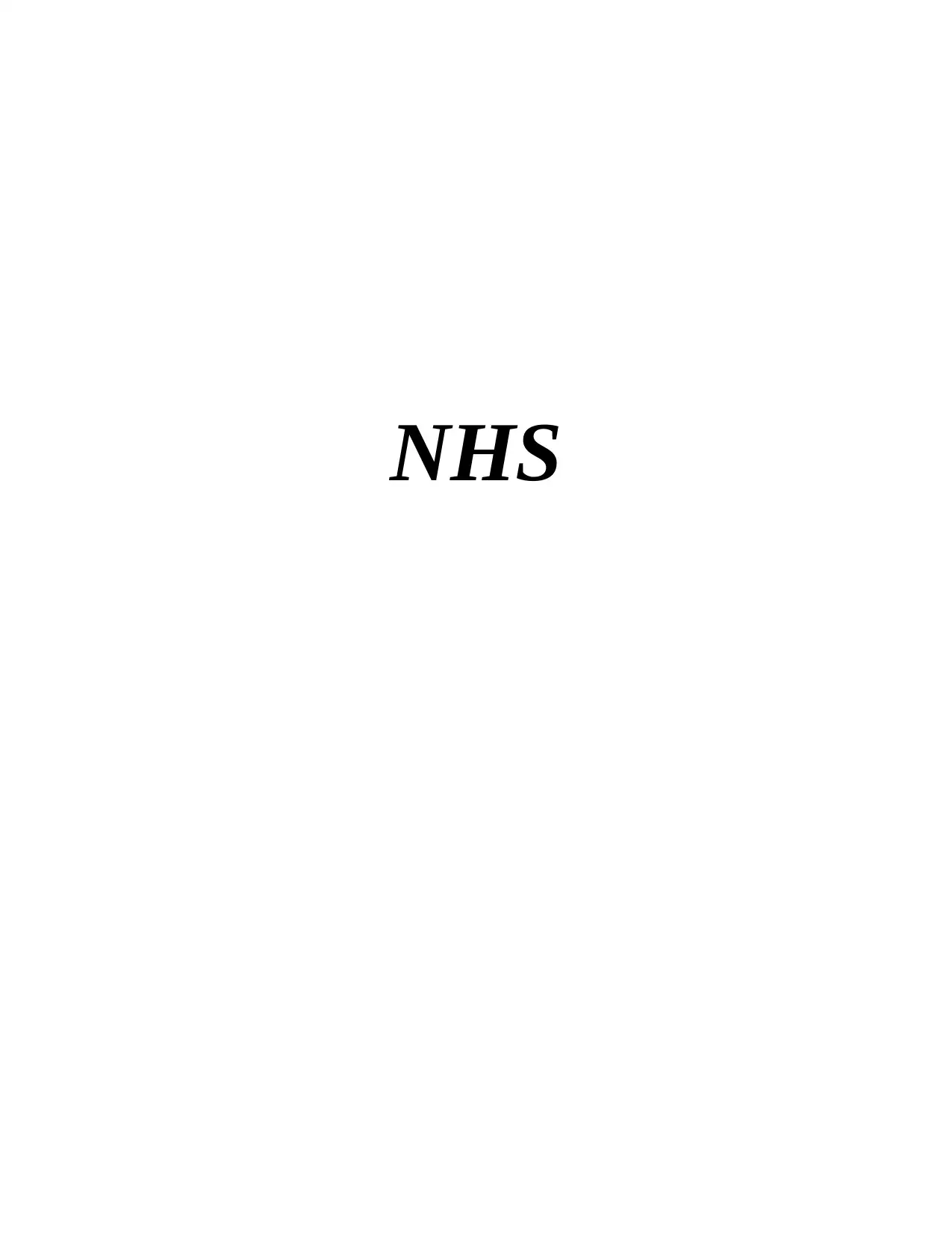
NHS
Paraphrase This Document
Need a fresh take? Get an instant paraphrase of this document with our AI Paraphraser
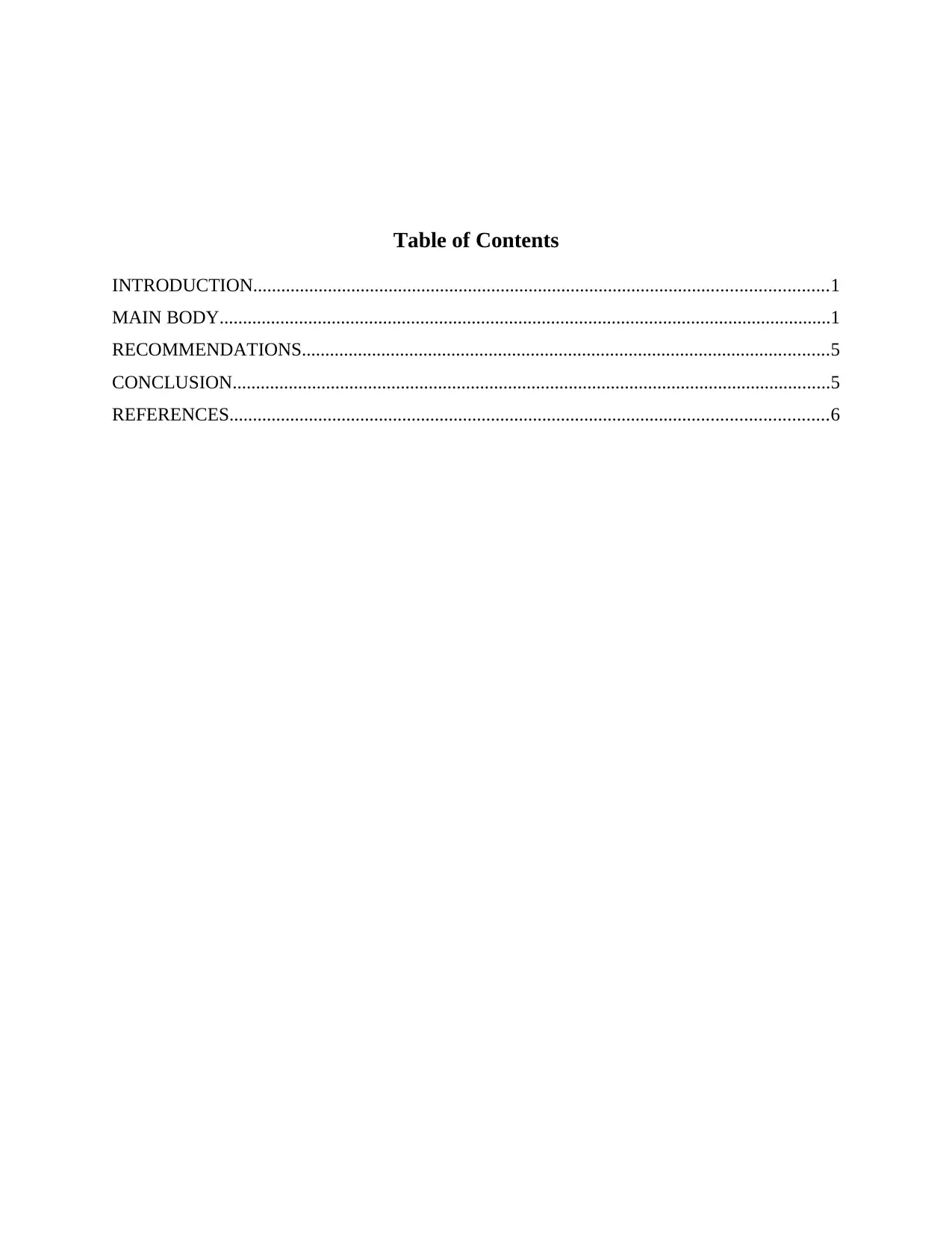
Table of Contents
INTRODUCTION...........................................................................................................................1
MAIN BODY...................................................................................................................................1
RECOMMENDATIONS.................................................................................................................5
CONCLUSION................................................................................................................................5
REFERENCES................................................................................................................................6
INTRODUCTION...........................................................................................................................1
MAIN BODY...................................................................................................................................1
RECOMMENDATIONS.................................................................................................................5
CONCLUSION................................................................................................................................5
REFERENCES................................................................................................................................6
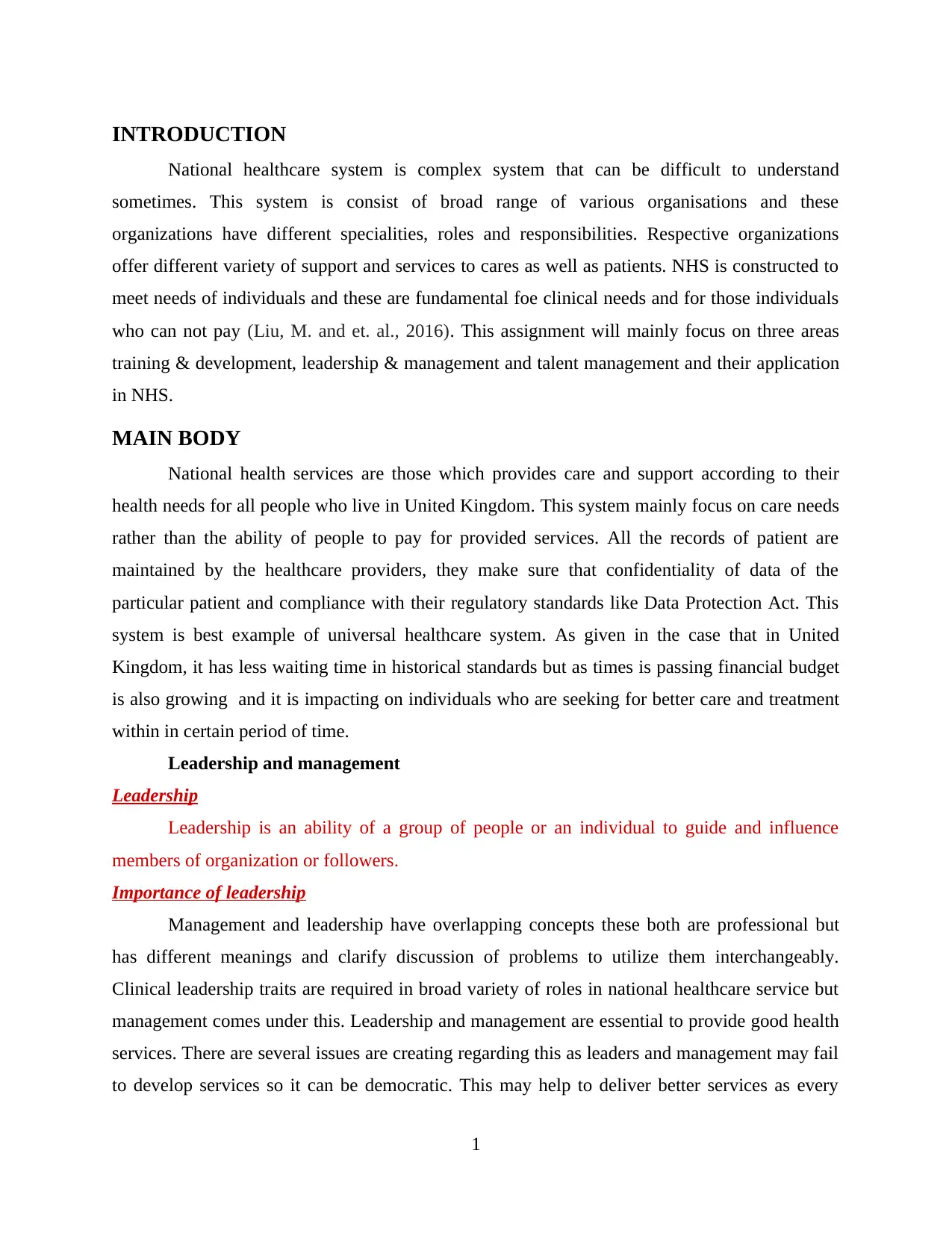
INTRODUCTION
National healthcare system is complex system that can be difficult to understand
sometimes. This system is consist of broad range of various organisations and these
organizations have different specialities, roles and responsibilities. Respective organizations
offer different variety of support and services to cares as well as patients. NHS is constructed to
meet needs of individuals and these are fundamental foe clinical needs and for those individuals
who can not pay (Liu, M. and et. al., 2016). This assignment will mainly focus on three areas
training & development, leadership & management and talent management and their application
in NHS.
MAIN BODY
National health services are those which provides care and support according to their
health needs for all people who live in United Kingdom. This system mainly focus on care needs
rather than the ability of people to pay for provided services. All the records of patient are
maintained by the healthcare providers, they make sure that confidentiality of data of the
particular patient and compliance with their regulatory standards like Data Protection Act. This
system is best example of universal healthcare system. As given in the case that in United
Kingdom, it has less waiting time in historical standards but as times is passing financial budget
is also growing and it is impacting on individuals who are seeking for better care and treatment
within in certain period of time.
Leadership and management
Leadership
Leadership is an ability of a group of people or an individual to guide and influence
members of organization or followers.
Importance of leadership
Management and leadership have overlapping concepts these both are professional but
has different meanings and clarify discussion of problems to utilize them interchangeably.
Clinical leadership traits are required in broad variety of roles in national healthcare service but
management comes under this. Leadership and management are essential to provide good health
services. There are several issues are creating regarding this as leaders and management may fail
to develop services so it can be democratic. This may help to deliver better services as every
1
National healthcare system is complex system that can be difficult to understand
sometimes. This system is consist of broad range of various organisations and these
organizations have different specialities, roles and responsibilities. Respective organizations
offer different variety of support and services to cares as well as patients. NHS is constructed to
meet needs of individuals and these are fundamental foe clinical needs and for those individuals
who can not pay (Liu, M. and et. al., 2016). This assignment will mainly focus on three areas
training & development, leadership & management and talent management and their application
in NHS.
MAIN BODY
National health services are those which provides care and support according to their
health needs for all people who live in United Kingdom. This system mainly focus on care needs
rather than the ability of people to pay for provided services. All the records of patient are
maintained by the healthcare providers, they make sure that confidentiality of data of the
particular patient and compliance with their regulatory standards like Data Protection Act. This
system is best example of universal healthcare system. As given in the case that in United
Kingdom, it has less waiting time in historical standards but as times is passing financial budget
is also growing and it is impacting on individuals who are seeking for better care and treatment
within in certain period of time.
Leadership and management
Leadership
Leadership is an ability of a group of people or an individual to guide and influence
members of organization or followers.
Importance of leadership
Management and leadership have overlapping concepts these both are professional but
has different meanings and clarify discussion of problems to utilize them interchangeably.
Clinical leadership traits are required in broad variety of roles in national healthcare service but
management comes under this. Leadership and management are essential to provide good health
services. There are several issues are creating regarding this as leaders and management may fail
to develop services so it can be democratic. This may help to deliver better services as every
1
⊘ This is a preview!⊘
Do you want full access?
Subscribe today to unlock all pages.

Trusted by 1+ million students worldwide
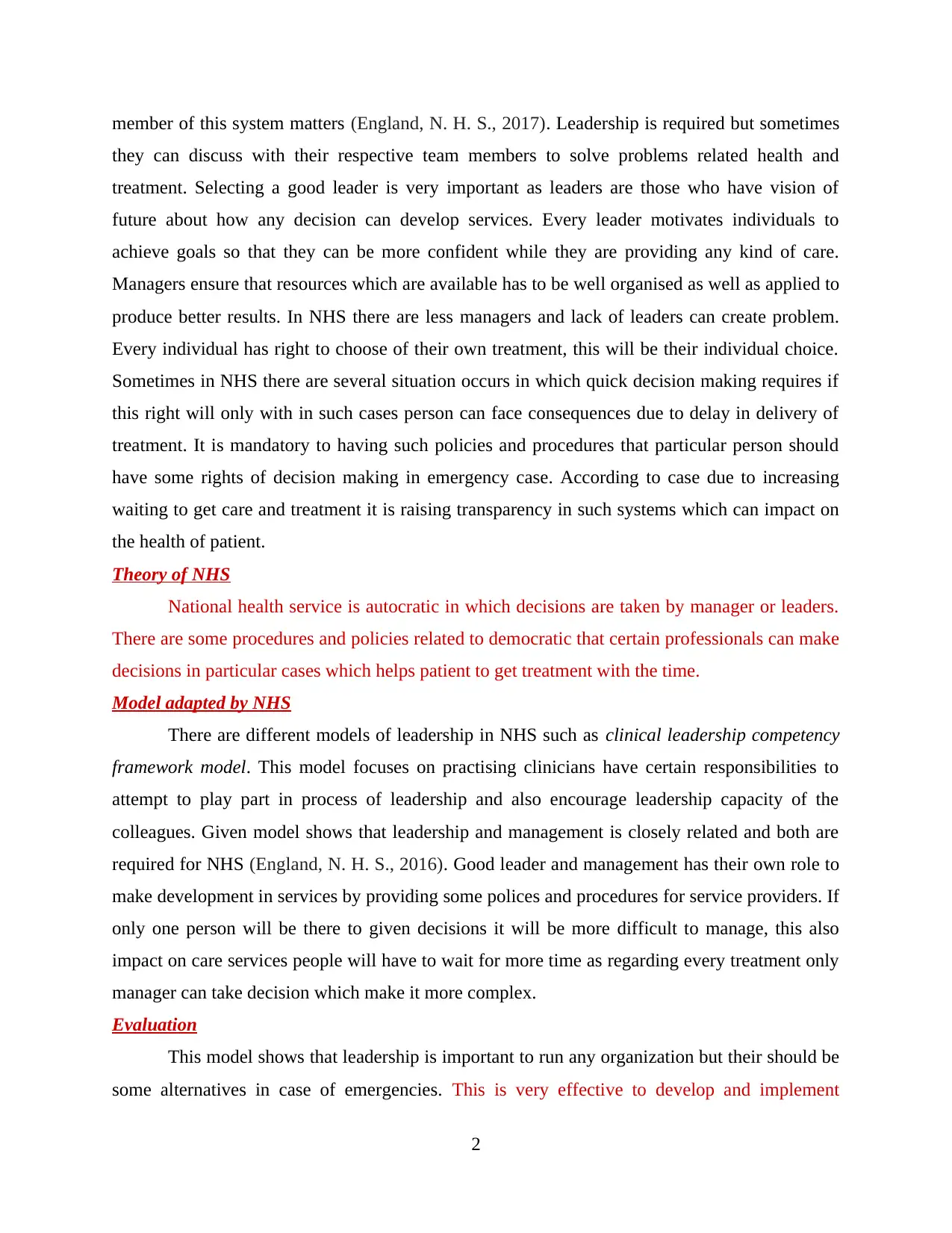
member of this system matters (England, N. H. S., 2017). Leadership is required but sometimes
they can discuss with their respective team members to solve problems related health and
treatment. Selecting a good leader is very important as leaders are those who have vision of
future about how any decision can develop services. Every leader motivates individuals to
achieve goals so that they can be more confident while they are providing any kind of care.
Managers ensure that resources which are available has to be well organised as well as applied to
produce better results. In NHS there are less managers and lack of leaders can create problem.
Every individual has right to choose of their own treatment, this will be their individual choice.
Sometimes in NHS there are several situation occurs in which quick decision making requires if
this right will only with in such cases person can face consequences due to delay in delivery of
treatment. It is mandatory to having such policies and procedures that particular person should
have some rights of decision making in emergency case. According to case due to increasing
waiting to get care and treatment it is raising transparency in such systems which can impact on
the health of patient.
Theory of NHS
National health service is autocratic in which decisions are taken by manager or leaders.
There are some procedures and policies related to democratic that certain professionals can make
decisions in particular cases which helps patient to get treatment with the time.
Model adapted by NHS
There are different models of leadership in NHS such as clinical leadership competency
framework model. This model focuses on practising clinicians have certain responsibilities to
attempt to play part in process of leadership and also encourage leadership capacity of the
colleagues. Given model shows that leadership and management is closely related and both are
required for NHS (England, N. H. S., 2016). Good leader and management has their own role to
make development in services by providing some polices and procedures for service providers. If
only one person will be there to given decisions it will be more difficult to manage, this also
impact on care services people will have to wait for more time as regarding every treatment only
manager can take decision which make it more complex.
Evaluation
This model shows that leadership is important to run any organization but their should be
some alternatives in case of emergencies. This is very effective to develop and implement
2
they can discuss with their respective team members to solve problems related health and
treatment. Selecting a good leader is very important as leaders are those who have vision of
future about how any decision can develop services. Every leader motivates individuals to
achieve goals so that they can be more confident while they are providing any kind of care.
Managers ensure that resources which are available has to be well organised as well as applied to
produce better results. In NHS there are less managers and lack of leaders can create problem.
Every individual has right to choose of their own treatment, this will be their individual choice.
Sometimes in NHS there are several situation occurs in which quick decision making requires if
this right will only with in such cases person can face consequences due to delay in delivery of
treatment. It is mandatory to having such policies and procedures that particular person should
have some rights of decision making in emergency case. According to case due to increasing
waiting to get care and treatment it is raising transparency in such systems which can impact on
the health of patient.
Theory of NHS
National health service is autocratic in which decisions are taken by manager or leaders.
There are some procedures and policies related to democratic that certain professionals can make
decisions in particular cases which helps patient to get treatment with the time.
Model adapted by NHS
There are different models of leadership in NHS such as clinical leadership competency
framework model. This model focuses on practising clinicians have certain responsibilities to
attempt to play part in process of leadership and also encourage leadership capacity of the
colleagues. Given model shows that leadership and management is closely related and both are
required for NHS (England, N. H. S., 2016). Good leader and management has their own role to
make development in services by providing some polices and procedures for service providers. If
only one person will be there to given decisions it will be more difficult to manage, this also
impact on care services people will have to wait for more time as regarding every treatment only
manager can take decision which make it more complex.
Evaluation
This model shows that leadership is important to run any organization but their should be
some alternatives in case of emergencies. This is very effective to develop and implement
2
Paraphrase This Document
Need a fresh take? Get an instant paraphrase of this document with our AI Paraphraser
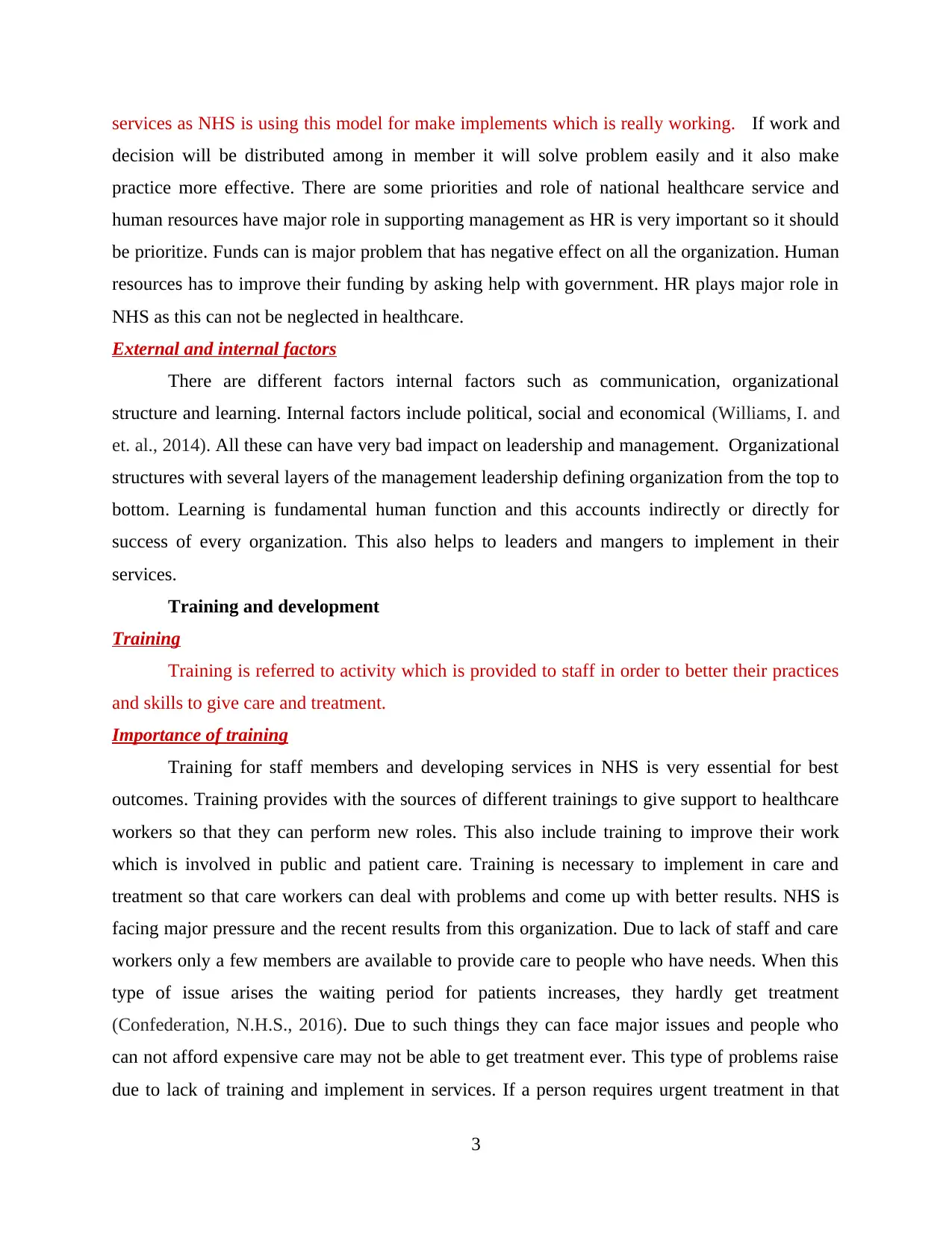
services as NHS is using this model for make implements which is really working. If work and
decision will be distributed among in member it will solve problem easily and it also make
practice more effective. There are some priorities and role of national healthcare service and
human resources have major role in supporting management as HR is very important so it should
be prioritize. Funds can is major problem that has negative effect on all the organization. Human
resources has to improve their funding by asking help with government. HR plays major role in
NHS as this can not be neglected in healthcare.
External and internal factors
There are different factors internal factors such as communication, organizational
structure and learning. Internal factors include political, social and economical (Williams, I. and
et. al., 2014). All these can have very bad impact on leadership and management. Organizational
structures with several layers of the management leadership defining organization from the top to
bottom. Learning is fundamental human function and this accounts indirectly or directly for
success of every organization. This also helps to leaders and mangers to implement in their
services.
Training and development
Training
Training is referred to activity which is provided to staff in order to better their practices
and skills to give care and treatment.
Importance of training
Training for staff members and developing services in NHS is very essential for best
outcomes. Training provides with the sources of different trainings to give support to healthcare
workers so that they can perform new roles. This also include training to improve their work
which is involved in public and patient care. Training is necessary to implement in care and
treatment so that care workers can deal with problems and come up with better results. NHS is
facing major pressure and the recent results from this organization. Due to lack of staff and care
workers only a few members are available to provide care to people who have needs. When this
type of issue arises the waiting period for patients increases, they hardly get treatment
(Confederation, N.H.S., 2016). Due to such things they can face major issues and people who
can not afford expensive care may not be able to get treatment ever. This type of problems raise
due to lack of training and implement in services. If a person requires urgent treatment in that
3
decision will be distributed among in member it will solve problem easily and it also make
practice more effective. There are some priorities and role of national healthcare service and
human resources have major role in supporting management as HR is very important so it should
be prioritize. Funds can is major problem that has negative effect on all the organization. Human
resources has to improve their funding by asking help with government. HR plays major role in
NHS as this can not be neglected in healthcare.
External and internal factors
There are different factors internal factors such as communication, organizational
structure and learning. Internal factors include political, social and economical (Williams, I. and
et. al., 2014). All these can have very bad impact on leadership and management. Organizational
structures with several layers of the management leadership defining organization from the top to
bottom. Learning is fundamental human function and this accounts indirectly or directly for
success of every organization. This also helps to leaders and mangers to implement in their
services.
Training and development
Training
Training is referred to activity which is provided to staff in order to better their practices
and skills to give care and treatment.
Importance of training
Training for staff members and developing services in NHS is very essential for best
outcomes. Training provides with the sources of different trainings to give support to healthcare
workers so that they can perform new roles. This also include training to improve their work
which is involved in public and patient care. Training is necessary to implement in care and
treatment so that care workers can deal with problems and come up with better results. NHS is
facing major pressure and the recent results from this organization. Due to lack of staff and care
workers only a few members are available to provide care to people who have needs. When this
type of issue arises the waiting period for patients increases, they hardly get treatment
(Confederation, N.H.S., 2016). Due to such things they can face major issues and people who
can not afford expensive care may not be able to get treatment ever. This type of problems raise
due to lack of training and implement in services. If a person requires urgent treatment in that
3
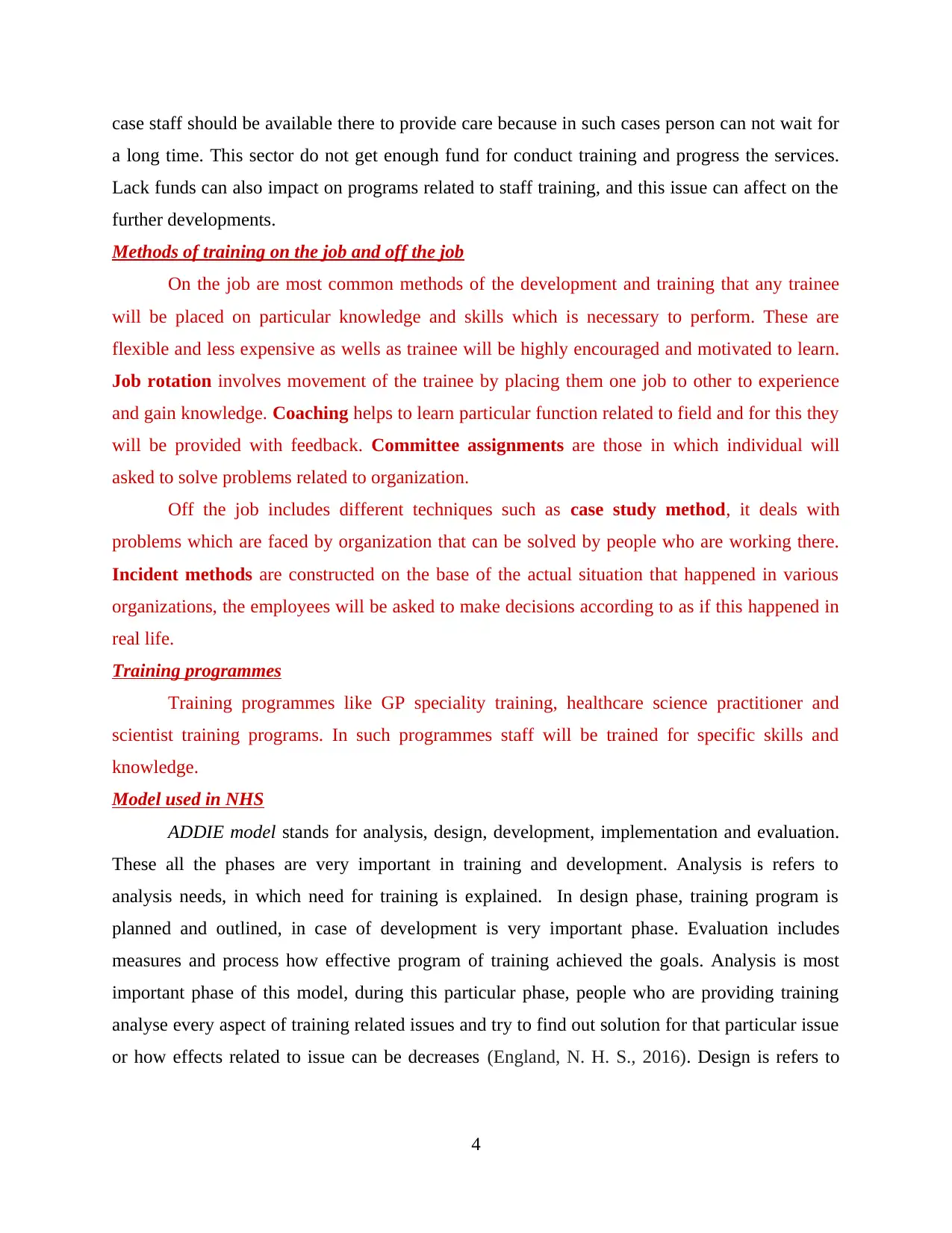
case staff should be available there to provide care because in such cases person can not wait for
a long time. This sector do not get enough fund for conduct training and progress the services.
Lack funds can also impact on programs related to staff training, and this issue can affect on the
further developments.
Methods of training on the job and off the job
On the job are most common methods of the development and training that any trainee
will be placed on particular knowledge and skills which is necessary to perform. These are
flexible and less expensive as wells as trainee will be highly encouraged and motivated to learn.
Job rotation involves movement of the trainee by placing them one job to other to experience
and gain knowledge. Coaching helps to learn particular function related to field and for this they
will be provided with feedback. Committee assignments are those in which individual will
asked to solve problems related to organization.
Off the job includes different techniques such as case study method, it deals with
problems which are faced by organization that can be solved by people who are working there.
Incident methods are constructed on the base of the actual situation that happened in various
organizations, the employees will be asked to make decisions according to as if this happened in
real life.
Training programmes
Training programmes like GP speciality training, healthcare science practitioner and
scientist training programs. In such programmes staff will be trained for specific skills and
knowledge.
Model used in NHS
ADDIE model stands for analysis, design, development, implementation and evaluation.
These all the phases are very important in training and development. Analysis is refers to
analysis needs, in which need for training is explained. In design phase, training program is
planned and outlined, in case of development is very important phase. Evaluation includes
measures and process how effective program of training achieved the goals. Analysis is most
important phase of this model, during this particular phase, people who are providing training
analyse every aspect of training related issues and try to find out solution for that particular issue
or how effects related to issue can be decreases (England, N. H. S., 2016). Design is refers to
4
a long time. This sector do not get enough fund for conduct training and progress the services.
Lack funds can also impact on programs related to staff training, and this issue can affect on the
further developments.
Methods of training on the job and off the job
On the job are most common methods of the development and training that any trainee
will be placed on particular knowledge and skills which is necessary to perform. These are
flexible and less expensive as wells as trainee will be highly encouraged and motivated to learn.
Job rotation involves movement of the trainee by placing them one job to other to experience
and gain knowledge. Coaching helps to learn particular function related to field and for this they
will be provided with feedback. Committee assignments are those in which individual will
asked to solve problems related to organization.
Off the job includes different techniques such as case study method, it deals with
problems which are faced by organization that can be solved by people who are working there.
Incident methods are constructed on the base of the actual situation that happened in various
organizations, the employees will be asked to make decisions according to as if this happened in
real life.
Training programmes
Training programmes like GP speciality training, healthcare science practitioner and
scientist training programs. In such programmes staff will be trained for specific skills and
knowledge.
Model used in NHS
ADDIE model stands for analysis, design, development, implementation and evaluation.
These all the phases are very important in training and development. Analysis is refers to
analysis needs, in which need for training is explained. In design phase, training program is
planned and outlined, in case of development is very important phase. Evaluation includes
measures and process how effective program of training achieved the goals. Analysis is most
important phase of this model, during this particular phase, people who are providing training
analyse every aspect of training related issues and try to find out solution for that particular issue
or how effects related to issue can be decreases (England, N. H. S., 2016). Design is refers to
4
⊘ This is a preview!⊘
Do you want full access?
Subscribe today to unlock all pages.

Trusted by 1+ million students worldwide
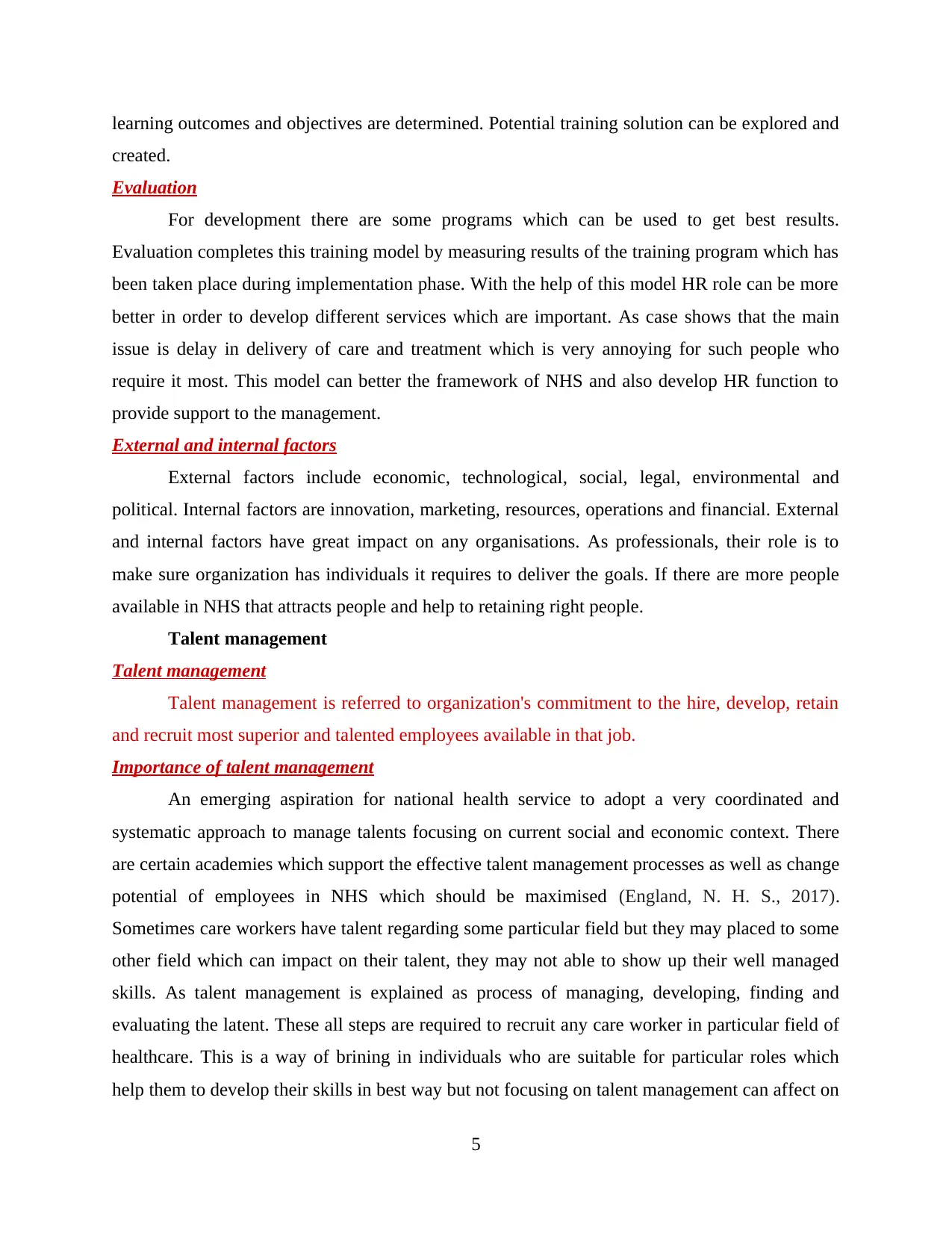
learning outcomes and objectives are determined. Potential training solution can be explored and
created.
Evaluation
For development there are some programs which can be used to get best results.
Evaluation completes this training model by measuring results of the training program which has
been taken place during implementation phase. With the help of this model HR role can be more
better in order to develop different services which are important. As case shows that the main
issue is delay in delivery of care and treatment which is very annoying for such people who
require it most. This model can better the framework of NHS and also develop HR function to
provide support to the management.
External and internal factors
External factors include economic, technological, social, legal, environmental and
political. Internal factors are innovation, marketing, resources, operations and financial. External
and internal factors have great impact on any organisations. As professionals, their role is to
make sure organization has individuals it requires to deliver the goals. If there are more people
available in NHS that attracts people and help to retaining right people.
Talent management
Talent management
Talent management is referred to organization's commitment to the hire, develop, retain
and recruit most superior and talented employees available in that job.
Importance of talent management
An emerging aspiration for national health service to adopt a very coordinated and
systematic approach to manage talents focusing on current social and economic context. There
are certain academies which support the effective talent management processes as well as change
potential of employees in NHS which should be maximised (England, N. H. S., 2017).
Sometimes care workers have talent regarding some particular field but they may placed to some
other field which can impact on their talent, they may not able to show up their well managed
skills. As talent management is explained as process of managing, developing, finding and
evaluating the latent. These all steps are required to recruit any care worker in particular field of
healthcare. This is a way of brining in individuals who are suitable for particular roles which
help them to develop their skills in best way but not focusing on talent management can affect on
5
created.
Evaluation
For development there are some programs which can be used to get best results.
Evaluation completes this training model by measuring results of the training program which has
been taken place during implementation phase. With the help of this model HR role can be more
better in order to develop different services which are important. As case shows that the main
issue is delay in delivery of care and treatment which is very annoying for such people who
require it most. This model can better the framework of NHS and also develop HR function to
provide support to the management.
External and internal factors
External factors include economic, technological, social, legal, environmental and
political. Internal factors are innovation, marketing, resources, operations and financial. External
and internal factors have great impact on any organisations. As professionals, their role is to
make sure organization has individuals it requires to deliver the goals. If there are more people
available in NHS that attracts people and help to retaining right people.
Talent management
Talent management
Talent management is referred to organization's commitment to the hire, develop, retain
and recruit most superior and talented employees available in that job.
Importance of talent management
An emerging aspiration for national health service to adopt a very coordinated and
systematic approach to manage talents focusing on current social and economic context. There
are certain academies which support the effective talent management processes as well as change
potential of employees in NHS which should be maximised (England, N. H. S., 2017).
Sometimes care workers have talent regarding some particular field but they may placed to some
other field which can impact on their talent, they may not able to show up their well managed
skills. As talent management is explained as process of managing, developing, finding and
evaluating the latent. These all steps are required to recruit any care worker in particular field of
healthcare. This is a way of brining in individuals who are suitable for particular roles which
help them to develop their skills in best way but not focusing on talent management can affect on
5
Paraphrase This Document
Need a fresh take? Get an instant paraphrase of this document with our AI Paraphraser
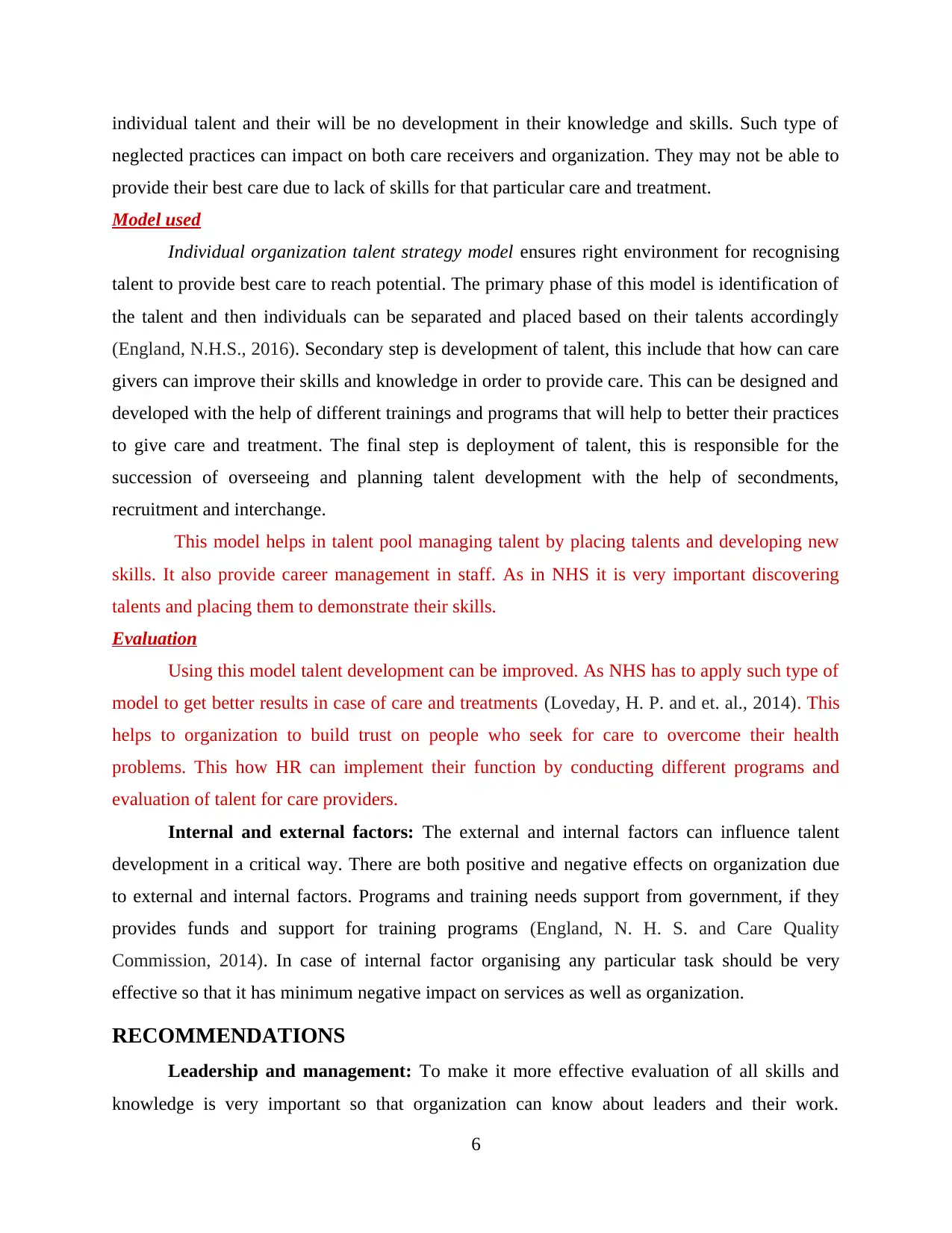
individual talent and their will be no development in their knowledge and skills. Such type of
neglected practices can impact on both care receivers and organization. They may not be able to
provide their best care due to lack of skills for that particular care and treatment.
Model used
Individual organization talent strategy model ensures right environment for recognising
talent to provide best care to reach potential. The primary phase of this model is identification of
the talent and then individuals can be separated and placed based on their talents accordingly
(England, N.H.S., 2016). Secondary step is development of talent, this include that how can care
givers can improve their skills and knowledge in order to provide care. This can be designed and
developed with the help of different trainings and programs that will help to better their practices
to give care and treatment. The final step is deployment of talent, this is responsible for the
succession of overseeing and planning talent development with the help of secondments,
recruitment and interchange.
This model helps in talent pool managing talent by placing talents and developing new
skills. It also provide career management in staff. As in NHS it is very important discovering
talents and placing them to demonstrate their skills.
Evaluation
Using this model talent development can be improved. As NHS has to apply such type of
model to get better results in case of care and treatments (Loveday, H. P. and et. al., 2014). This
helps to organization to build trust on people who seek for care to overcome their health
problems. This how HR can implement their function by conducting different programs and
evaluation of talent for care providers.
Internal and external factors: The external and internal factors can influence talent
development in a critical way. There are both positive and negative effects on organization due
to external and internal factors. Programs and training needs support from government, if they
provides funds and support for training programs (England, N. H. S. and Care Quality
Commission, 2014). In case of internal factor organising any particular task should be very
effective so that it has minimum negative impact on services as well as organization.
RECOMMENDATIONS
Leadership and management: To make it more effective evaluation of all skills and
knowledge is very important so that organization can know about leaders and their work.
6
neglected practices can impact on both care receivers and organization. They may not be able to
provide their best care due to lack of skills for that particular care and treatment.
Model used
Individual organization talent strategy model ensures right environment for recognising
talent to provide best care to reach potential. The primary phase of this model is identification of
the talent and then individuals can be separated and placed based on their talents accordingly
(England, N.H.S., 2016). Secondary step is development of talent, this include that how can care
givers can improve their skills and knowledge in order to provide care. This can be designed and
developed with the help of different trainings and programs that will help to better their practices
to give care and treatment. The final step is deployment of talent, this is responsible for the
succession of overseeing and planning talent development with the help of secondments,
recruitment and interchange.
This model helps in talent pool managing talent by placing talents and developing new
skills. It also provide career management in staff. As in NHS it is very important discovering
talents and placing them to demonstrate their skills.
Evaluation
Using this model talent development can be improved. As NHS has to apply such type of
model to get better results in case of care and treatments (Loveday, H. P. and et. al., 2014). This
helps to organization to build trust on people who seek for care to overcome their health
problems. This how HR can implement their function by conducting different programs and
evaluation of talent for care providers.
Internal and external factors: The external and internal factors can influence talent
development in a critical way. There are both positive and negative effects on organization due
to external and internal factors. Programs and training needs support from government, if they
provides funds and support for training programs (England, N. H. S. and Care Quality
Commission, 2014). In case of internal factor organising any particular task should be very
effective so that it has minimum negative impact on services as well as organization.
RECOMMENDATIONS
Leadership and management: To make it more effective evaluation of all skills and
knowledge is very important so that organization can know about leaders and their work.
6
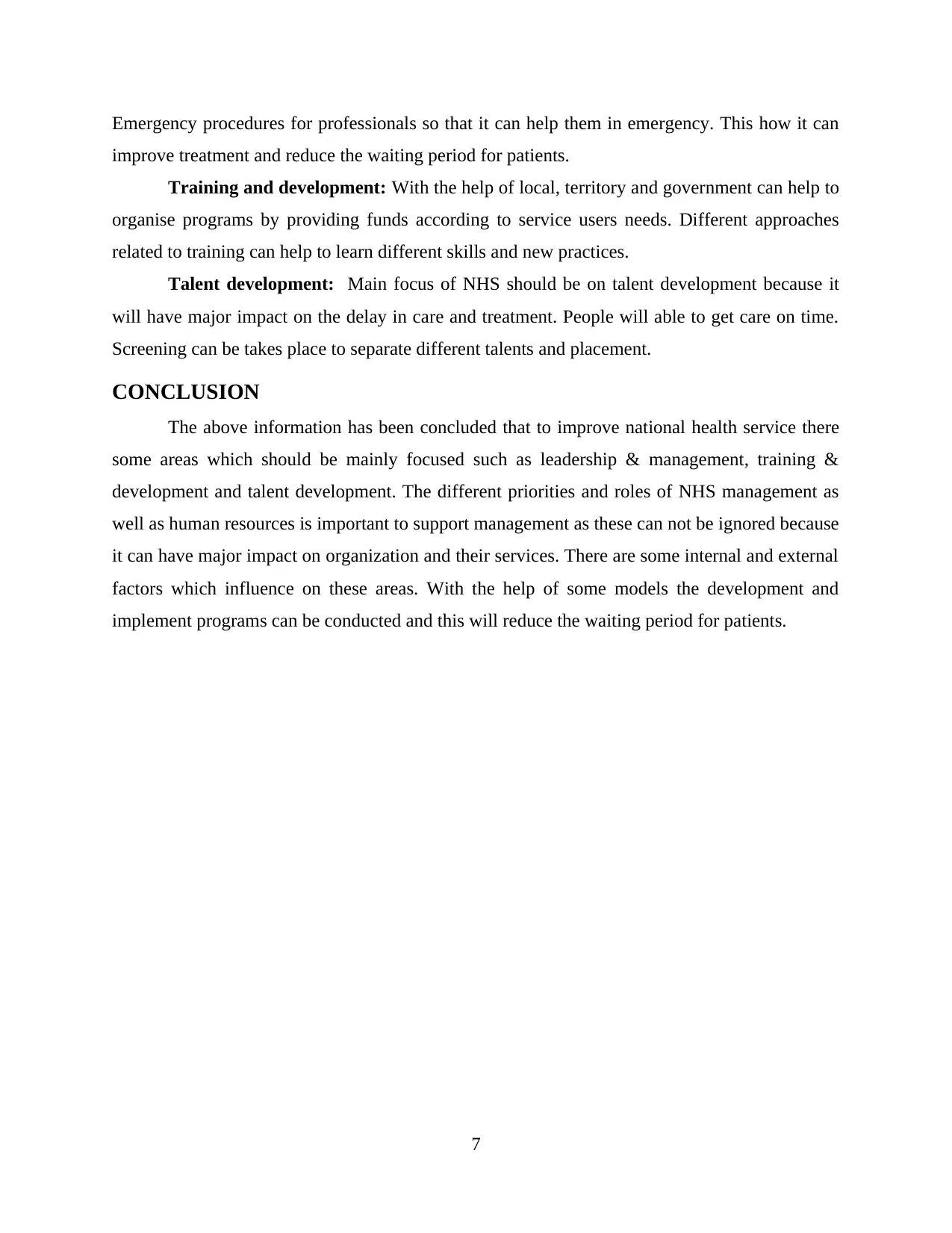
Emergency procedures for professionals so that it can help them in emergency. This how it can
improve treatment and reduce the waiting period for patients.
Training and development: With the help of local, territory and government can help to
organise programs by providing funds according to service users needs. Different approaches
related to training can help to learn different skills and new practices.
Talent development: Main focus of NHS should be on talent development because it
will have major impact on the delay in care and treatment. People will able to get care on time.
Screening can be takes place to separate different talents and placement.
CONCLUSION
The above information has been concluded that to improve national health service there
some areas which should be mainly focused such as leadership & management, training &
development and talent development. The different priorities and roles of NHS management as
well as human resources is important to support management as these can not be ignored because
it can have major impact on organization and their services. There are some internal and external
factors which influence on these areas. With the help of some models the development and
implement programs can be conducted and this will reduce the waiting period for patients.
7
improve treatment and reduce the waiting period for patients.
Training and development: With the help of local, territory and government can help to
organise programs by providing funds according to service users needs. Different approaches
related to training can help to learn different skills and new practices.
Talent development: Main focus of NHS should be on talent development because it
will have major impact on the delay in care and treatment. People will able to get care on time.
Screening can be takes place to separate different talents and placement.
CONCLUSION
The above information has been concluded that to improve national health service there
some areas which should be mainly focused such as leadership & management, training &
development and talent development. The different priorities and roles of NHS management as
well as human resources is important to support management as these can not be ignored because
it can have major impact on organization and their services. There are some internal and external
factors which influence on these areas. With the help of some models the development and
implement programs can be conducted and this will reduce the waiting period for patients.
7
⊘ This is a preview!⊘
Do you want full access?
Subscribe today to unlock all pages.

Trusted by 1+ million students worldwide
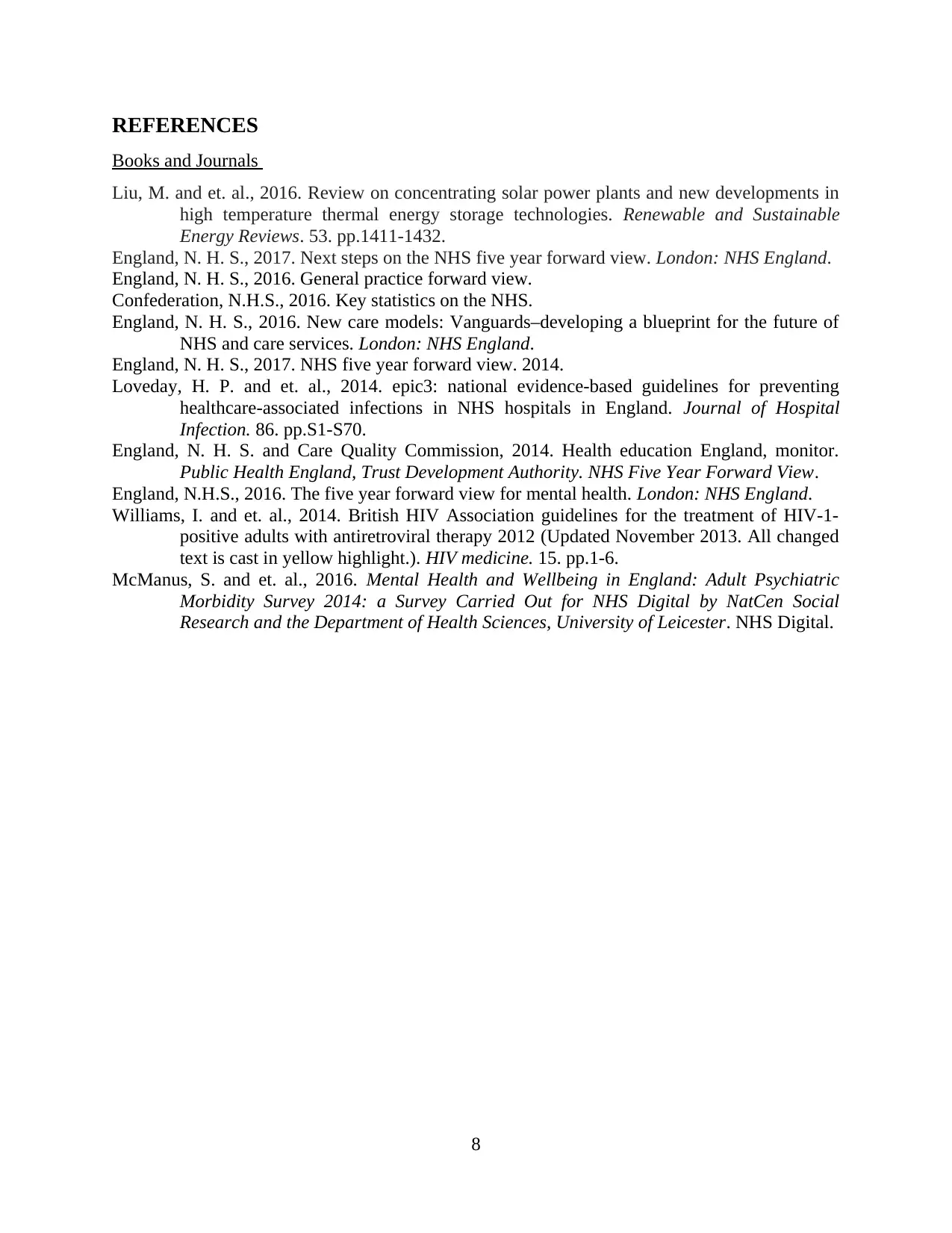
REFERENCES
Books and Journals
Liu, M. and et. al., 2016. Review on concentrating solar power plants and new developments in
high temperature thermal energy storage technologies. Renewable and Sustainable
Energy Reviews. 53. pp.1411-1432.
England, N. H. S., 2017. Next steps on the NHS five year forward view. London: NHS England.
England, N. H. S., 2016. General practice forward view.
Confederation, N.H.S., 2016. Key statistics on the NHS.
England, N. H. S., 2016. New care models: Vanguards–developing a blueprint for the future of
NHS and care services. London: NHS England.
England, N. H. S., 2017. NHS five year forward view. 2014.
Loveday, H. P. and et. al., 2014. epic3: national evidence-based guidelines for preventing
healthcare-associated infections in NHS hospitals in England. Journal of Hospital
Infection. 86. pp.S1-S70.
England, N. H. S. and Care Quality Commission, 2014. Health education England, monitor.
Public Health England, Trust Development Authority. NHS Five Year Forward View.
England, N.H.S., 2016. The five year forward view for mental health. London: NHS England.
Williams, I. and et. al., 2014. British HIV Association guidelines for the treatment of HIV‐1‐
positive adults with antiretroviral therapy 2012 (Updated November 2013. All changed
text is cast in yellow highlight.). HIV medicine. 15. pp.1-6.
McManus, S. and et. al., 2016. Mental Health and Wellbeing in England: Adult Psychiatric
Morbidity Survey 2014: a Survey Carried Out for NHS Digital by NatCen Social
Research and the Department of Health Sciences, University of Leicester. NHS Digital.
8
Books and Journals
Liu, M. and et. al., 2016. Review on concentrating solar power plants and new developments in
high temperature thermal energy storage technologies. Renewable and Sustainable
Energy Reviews. 53. pp.1411-1432.
England, N. H. S., 2017. Next steps on the NHS five year forward view. London: NHS England.
England, N. H. S., 2016. General practice forward view.
Confederation, N.H.S., 2016. Key statistics on the NHS.
England, N. H. S., 2016. New care models: Vanguards–developing a blueprint for the future of
NHS and care services. London: NHS England.
England, N. H. S., 2017. NHS five year forward view. 2014.
Loveday, H. P. and et. al., 2014. epic3: national evidence-based guidelines for preventing
healthcare-associated infections in NHS hospitals in England. Journal of Hospital
Infection. 86. pp.S1-S70.
England, N. H. S. and Care Quality Commission, 2014. Health education England, monitor.
Public Health England, Trust Development Authority. NHS Five Year Forward View.
England, N.H.S., 2016. The five year forward view for mental health. London: NHS England.
Williams, I. and et. al., 2014. British HIV Association guidelines for the treatment of HIV‐1‐
positive adults with antiretroviral therapy 2012 (Updated November 2013. All changed
text is cast in yellow highlight.). HIV medicine. 15. pp.1-6.
McManus, S. and et. al., 2016. Mental Health and Wellbeing in England: Adult Psychiatric
Morbidity Survey 2014: a Survey Carried Out for NHS Digital by NatCen Social
Research and the Department of Health Sciences, University of Leicester. NHS Digital.
8
1 out of 10
Related Documents
Your All-in-One AI-Powered Toolkit for Academic Success.
+13062052269
info@desklib.com
Available 24*7 on WhatsApp / Email
![[object Object]](/_next/static/media/star-bottom.7253800d.svg)
Unlock your academic potential
Copyright © 2020–2026 A2Z Services. All Rights Reserved. Developed and managed by ZUCOL.





